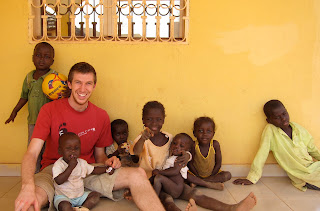Everyone has a story. Where they came from, where they are, where they wish to go. Life is an endless library of experience that we, the authors, the readers, the critics, and the protagonists continually fill.
To be frank, it’s not realistic to recount an entire story in one short blog post, but what follows will be my attempt. I will give you a glimpse into the life of SALOU Kientega Kiswendsida Clarisse; one of the women that lives in our courtyard. Sunday night, sitting at the foot of a dusty gazebo and surrounded by children curious about my computer, I asked Clarisse some questions about her life.
 |
| SALOU Nomwendé Ingred Djamiilatou Rosen (Photo taken by Marie Warkentin) |
She did return to live with her mother in Yako, and at that time began schooling. She continued her studies until just before completing the BAC (an exam that takes place at the end of high school). She was forced to put schooling on hold when she became pregnant in 2006. She met her husband, SALOU Adama, in 2005 and became his second wife. She brought her first child into this world, a daughter, on January 22nd, 2007 at 1:45pm: SALOU Nomwendé Ingred Djamiilatou Rosen (She tells me she can remember the delivery like it was yesterday. Trying to be witty, I tell her I am lucky to be a man. Her contagious laugh fills the air. She agrees and assures me that giving birth is not an easy thing).
In 2008, Clarisse was still living with her mother. Because of this, she was able to go to night school while leaving Rosen at home. Regrettably though, on November 22nd, 2009, her mother passed away and she was again unable to finish the BAC. Given her situation, she moved in with her husband and his first wife in the courtyard where she currently resides with us. The most recent turing point came on August 13th, 2010 at 5:44am when she gave birth to her son, SALOU Abdala.
In 2008, Clarisse was still living with her mother. Because of this, she was able to go to night school while leaving Rosen at home. Regrettably though, on November 22nd, 2009, her mother passed away and she was again unable to finish the BAC. Given her situation, she moved in with her husband and his first wife in the courtyard where she currently resides with us. The most recent turing point came on August 13th, 2010 at 5:44am when she gave birth to her son, SALOU Abdala.
 |
| SALOU Abdala (Photo taken by Marie Warkentin) |
I ask: What do you want from this life? She responds gracefully: Everyday, I pray to God that I will get a job. I pray that I can take care of my children. I pray also that one day, when I grow old, my children will be able to take care of me. Right now though, I hope for a job.
She has been searching for work for the last seven years. She tells me of a situation last year where she was almost hired as a primary school teacher. She had passed the oral and written exams, but when it came to the sports section, she had a cramp during the test and failed. With a hint of despair in her voice, she tells me: I feel like it was my last chance in this life to find a job.
She has also applied at other organizations. They have come back and told her that she needs computer literacy. With this knowledge, she can be hired. She has not yet been able to find a computer training opportunity.
 I ask her what she thinks the problem is; why has finding a job been so hard? Time, she responds. She works all day in the courtyard either preparing meals, doing laundry, taking care of kids or any other task that consumes her day. When she is finally free in the late evening, she is too tired.
I ask her what she thinks the problem is; why has finding a job been so hard? Time, she responds. She works all day in the courtyard either preparing meals, doing laundry, taking care of kids or any other task that consumes her day. When she is finally free in the late evening, she is too tired.
When the informal interview ends, the group of women and children that have gathered to watch the excitement start chatting in Mooré. Before I head back inside, I ask what they were talking about. Adama, the oldest boy in the courtyard, laughs and says that they were saying how white people always take pictures and show them to people back home.
I don’t know why I did this interview. I thought it would be enlightening for folks elsewhere to read the story of a local Burkinabé woman. But when they said this, it made me question my motives. There is a fine line between inquisitiveness and exploitation I suppose. I just hope I’m not offside.
I don’t know why I did this interview. I thought it would be enlightening for folks elsewhere to read the story of a local Burkinabé woman. But when they said this, it made me question my motives. There is a fine line between inquisitiveness and exploitation I suppose. I just hope I’m not offside.





